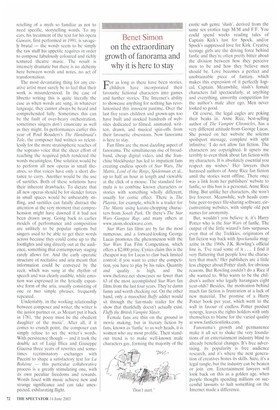Benet Simon on the extraordinary growth of fanorama and why it is here to stay
"rot as long as there have been stories, 1: children have incorporated their favourite fictional characters into games and further stories. The Internet's ability to showcase anything for nothing has revolutionised this innocent pastime. Over the last five years children and grown-ups too have built and stocked hundreds of websites dedicated to filmed, animated, written, drawn, and musical spin-offs from their favourite obsessions. Now fanorama is here to stay.
Fan films are the most dazzling aspect of fanorama. The simultaneous rise of broadband, cheap digital video, and the franchise blockbuster has led to impatient fans creating endless spoofs of Star Wars, The Matrix, Lord of the Rings, Spidertnan et al., up to half an hour in length and viewable at the click of a mouse. The standard formula is to combine known characters or stories with something wholly different, usually for comic effect. There is The Playnix, for example, which is a trailer for The Matrix using karate-chopping characters from South Park. Or there's The Star Wars Gangsta Rap, and many others at www.atom.shockw ave.com •
Star Wars fan films are by far the most numerous, and a forward-looking George Lucas promotes the phenomenon with the Star Wars Fan Film Competition, which offers a $2,000 prize. Cynics claim this is the cheapest way for Lucas to claw back limited control: if you want to enter the competition, you have to play by his rules. Quantity and quality is high, and the www.theforce.net showcases no fewer than 63 of the most accomplished Star Wars fan films from the last four years. They're damn funny and worth checking out. On the other hand, only a masochist Bufb.' addict would sit through the fan-made trailer for the show that thankfully doesn't actually exist, Fluffy the British Vampire Slayer.
Female fans are thin on the ground in movie making, but in literary fiction by fans, known as 'fanfic' to us web heads, it is women who are most prolific. Their standout trend is to make well-known male characters gay, forming the majority of the erotic sub genre 'slash', derived from the same sex erotica tags M/M and F/F. You could spend weeks reading tales of Captain Kirk's lust for Spock, and/or Spock's suppressed love for Kirk. Creative teenage girls are the driving force behind fanfic and they're often pretty bitter about the division between how they perceive men to be and how they believe men should be. Love becomes a perfect and unobtainable piece of fantasy, which makes this expression of it perfectly logical. Captain. Meanwhile, slash's female characters fail spectacularly, at anything and everything, unworthy competition for the author's male alter ego. Men never looked so good.
Of course, the legal eagles are poking their beaks in. Anne Rice, best-selling author of The Vampire Chronicles, has a very different attitude from George Lucas. She posted on her website the solemn spoilsport message, complete with split infinitive: 'I do not allow fan fiction. The characters are copyrighted. It upsets me terribly to even think about fan fiction with my characters. It is absolutely essential you respect my wishes.' Her lawyers then harassed authors of Anne Rice fan fiction until the stories went offline. There once was a link from her publishers' website to fanfic, so this ban is a personal, Anne Rice thing. But unlike her characters, she won't live forever. Meanwhile, web heads combine peer-to-peer file-sharing software, circumventing websites, with simple old pen names for anonymity.
But, wouldn't you believe it, it's Harry Potter who is the Star Wars of fanfic. The output of the little wizard's fans surpasses even that of the Trekkies, originators of fan fiction way back with Spockanalia magazine in the 1960s. J.K. Rowling's official line is, `I've read some of it . . . I find it very flattering that people love the characters that much.' Her publishers are a little less chipper about Potter slash, for obvious reasons. But Rowling couldn't do a Rice if she wanted to. Who wants to be the children's author who legally harangues eight year-olds? Besides, the motivation behind much fan fiction is frustration at a lack of new material. The promise of a Harry Potter book per year, which went to the wall in favour of endless Potter product synergy, leaves the rights holders with only themselves to blame for the varied quality at www.fanfictiontinks.com.
Fanorama's growth and permanence make it all set to shake the very foundations of an entertainment industry blind to already beneficial changes. It's free advertising, its popularity is free audience research, and it's where the next generation of creatives hones its skills. Sure, it's a legal tangle, but the industry can be beaten or join 'em. Entertainment lawyers will look back on this as a golden age, when people thought spending millions on successful lawsuits to halt something on the Internet made a difference.


































































































 Previous page
Previous page